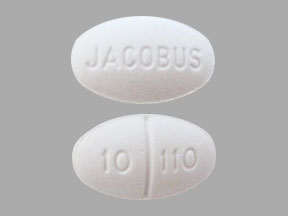Ruzurgi Side Effects
Generic name: amifampridine
Medically reviewed by Drugs.com. Last updated on Aug 23, 2024.
Note: This document provides detailed information about Ruzurgi Side Effects associated with amifampridine. Some dosage forms listed on this page may not apply specifically to the brand name Ruzurgi.
Applies to amifampridine: oral tablet.
Precautions
It is very important that your doctor check your or your child's progress at regular visits to make sure this medicine is working properly.
This medicine may increase your risk for seizures and should not be given to patients who have had seizures.
This medicine may cause serious allergic reactions, including anaphylaxis, which can be life-threatening and require immediate medical attention. Tell your doctor right away if you have a rash, itching, hoarseness, trouble breathing, trouble swallowing, or any swelling of your hands, face, or mouth after using this medicine.
Do not take other medicines unless they have been discussed with your doctor. This includes prescription or nonprescription (over-the-counter [OTC]) medicines and herbal or vitamin supplements.
Serious side effects of Ruzurgi
Along with its needed effects, amifampridine (the active ingredient contained in Ruzurgi) may cause some unwanted effects. Although not all of these side effects may occur, if they do occur they may need medical attention.
Check with your doctor immediately if any of the following side effects occur while taking amifampridine:
More common side effects
- arm or leg pain
- bladder pain
- bloating or swelling of the face, arms, hands, lower legs, or feet
- bloody or cloudy urine
- blurred vision
- burning, crawling, itching, numbness, prickling, "pins and needles", or tingling feelings
- chest pain or tightness
- chills
- cough
- cough producing mucus
- diarrhea
- difficult, burning, or painful urination
- difficulty breathing or swallowing
- dizziness
- fever
- frequent urge to urinate
- general feeling of discomfort or illness
- headache
- hoarseness
- joint pain
- loss of appetite
- lower back or side pain
- muscle pains, spasms, or weakness
- nausea
- nervousness
- pounding in the ears
- rapid weight gain
- runny nose
- shivering
- slow or fast heartbeat
- sneezing
- sore throat
- sweating
- swollen, painful, or tender lymph glands in the neck, armpit, or groin
- trouble sleeping
- unusual tiredness or weakness
- unusual weight gain or loss
- vomiting
Other side effects of Ruzurgi
Some side effects of amifampridine may occur that usually do not need medical attention. These side effects may go away during treatment as your body adjusts to the medicine. Also, your health care professional may be able to tell you about ways to prevent or reduce some of these side effects.
Check with your health care professional if any of the following side effects continue or are bothersome or if you have any questions about them:
More common side effects
- back pain
- blindness
- constipation
- decreased vision
- discouragement
- falls
- feeling cold
- feeling sad or empty
- heartburn
- irritability
- lack or loss of strength
- loss of interest or pleasure
- pale skin
- stomach pain
- trouble concentrating
- trouble breathing
- unusual bleeding or bruising
See also:
For healthcare professionals
Applies to amifampridine: oral tablet.
Hematologic adverse events
- Common (1% to 10%): Lymphadenopathy[Ref]
Immunologic
- Common (1% to 10%): Viral infection[Ref]
Musculoskeletal
- Very common (10% or more): Back pain (14%), muscle spasm (12%), muscle weakness (10%), pain in extremity (10%)
- Common (1% to 10%): Blood creatine phosphokinase increased[Ref]
Ocular
- Very common (10% or more): Cataract (10%)
- Frequency not reported: Blurred vision[Ref]
Metabolic
- Common (1% to 10%): Peripheral edema
- Uncommon (0.1% to 1%): Hypercholesterolemia[Ref]
Psychiatric
- Common (1% to 10%): Insomnia, depression
- Frequency not reported: Sleep disorders, anxiety[Ref]
Genitourinary
- Common (1% to 10%): Urinary tract infection[Ref]
Hepatic
- Very common (10% or more): Elevated liver enzymes (e.g., elevated alanine aminotransferase [ALT], aspartate aminotransferase [AST], lactate dehydrogenase [LDH], gamma-glutamyl transferase [GGT] (14%)
transferase (GGT)[Ref]
Respiratory
- Very common (10% or more): Upper respiratory tract infection (33%)
- Common (1% to 10%): Bronchitis, dyspnea, influenza
- Frequency not reported: Bronchial hypersecretion, asthma attack in asthmatic patients or patients with a history of asthma, cough[Ref]
Other
- Common (1% to 10%): Fall, pyrexia[Ref]
Nervous system
- Very common (10% or more): Paresthesia/dysesthesia (i.e., oral paresthesia, oral hypoesthesia) (69%), headache (14%), dizziness (10%), asthenia (10%)
- Common (1% to 10%): Seizures[Ref]
Cardiovascular
- Very common (10% or more): Hypertension (12%)
- Frequency not reported: Raynaud's syndrome, cardiac rhythm disorders, palpitations[Ref]
Dermatologic
Gastrointestinal
- Very common (10% or more): Abdominal pain (14%), nausea (14%), diarrhea (14%), dyspepsia (17%)
- Common (1% to 10%): Constipation, GI reflux
- Frequency not reported:: Epigastralgia[Ref]
References
1. (2018) "Product Information. Firdapse (amifampridine)." Catalyst Pharmaceuticals, Inc.
2. (2021) "Product Information. Ruzurgi (amifampridine)." Medunik Canada
Frequently asked questions
- What is the difference between Ruzurgi and Firdapse?
- What is Firdapse (amifampridine) used to treat?
More about Ruzurgi (amifampridine)
- Check interactions
- Compare alternatives
- Reviews (2)
- Drug images
- Latest FDA alerts (1)
- Dosage information
- During pregnancy
- FDA approval history
- Drug class: cholinergic muscle stimulants
- Breastfeeding
Patient resources
Other brands
Professional resources
Other brands
Related treatment guides
Further information
Ruzurgi side effects can vary depending on the individual. Always consult your healthcare provider to ensure the information displayed on this page applies to your personal circumstances.
Note: Medication side effects may be underreported. If you are experiencing side effects that are not listed, submit a report to the FDA by following this guide.

